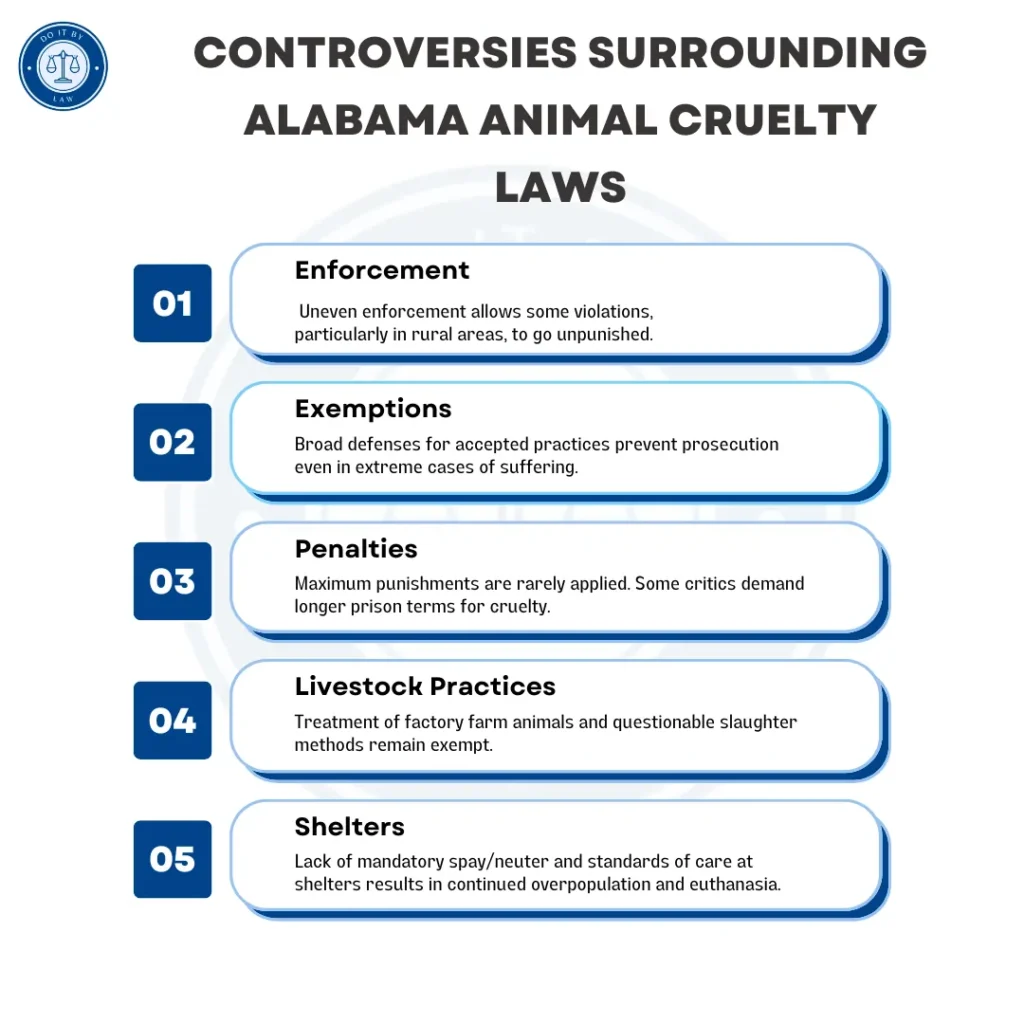

Alabama has laws in place to punish cruel, abusive, and neglectful acts toward animals. Understanding the state’s animal cruelty statutes can help residents avoid violations and support reforms where needed. This guide covers Alabama Animal Cruelty Laws provisions, penalties, exemptions, enforcement, and more.
We’ll explore when laws were passed, who and what they cover, what constitutes animal cruelty, punishment options, recent changes, ongoing controversies, and frequently asked questions. Whether you own pets or livestock, work in animal industries, or are an advocate, knowledge of Alabama’s animal welfare rules is important.
Alabama first enacted anti-cruelty legislation in 1852. Early laws focused on preventing animals from being overloaded, tortured, or deprived of food and drink. Punishments were minor.
Expanded statutes passed in the 1960s-1980s increased penalties and defined animal cruelty more specifically. These laws recognized animal suffering as an issue of broader social concern beyond just protecting property rights.
Alabama’s current animal protection laws continue evolving to balance personal freedoms, animal welfare, accepted hunting/farming practices, and public morality standards. Stopping gratuitous cruelty remains the key objective.
Alabama’s anti-cruelty statutes apply to any person who owns or has custody of an animal residing temporarily or permanently in the state.
Anyone responsible for an animal’s care in Alabama must provide proper sustenance, shelter, and medical attention and avoid abuse. Those failing to do so face prosecution.
Some key components of Alabama’s animal cruelty laws include:
Animal cruelty convictions in Alabama can result in:
Penalties escalate for repeat offenders. Those with animal cruelty convictions cannot work in animal-related jobs like at veterinary clinics, shelters, or pet stores.
Some legal exemptions or defenses for accused animal abusers include:
These defenses highlight how Alabama seeks to target intentional cruelty more than accepted practices and unintentional lapses in care.
A mix of agencies enforce animal welfare statutes in Alabama:
Stiffer penalties in recent years have empowered these agencies to take a tougher stance on serious animal cruelty offenses.
Some impactful updates to Alabama’s animal cruelty laws in recent years include:
These stricter statutes reflect evolving social attitudes toward animal mistreatment in Alabama. Lawmakers continue expanding anti-cruelty provisions.
Despite progress, some areas of debate and controversy persist regarding Alabama’s animal welfare statutes.

Reforms to address these concerns continue facing resistance. But animal advocates will keep pressure on lawmakers to enact changes.
In summary, the key takeaways on animal cruelty laws in Alabama include:
Understanding your duties and liabilities under Alabama’s animal protection statutes is crucial for all animal owners and handlers within the state. Do your part to report suspected abuse and promote humane treatment.
Document evidence and report it to local law enforcement, animal control, SPCA, or other humane authorities immediately to prompt investigation. Provide details.
Are cock and dog fighting still problems in Alabama?Illegal animal fighting persists, particularly with dogs in rural areas. However, expanded laws have helped crack down on these cruel practices. Stiffer penalties deter involvement.
Is leaving a dog in a hot car considered cruelty in Alabama?Yes, confining an animal in a vehicle in extreme heat or cold that poses a risk to their health can qualify as abuse and neglect under the law.
What if I cannot afford vet care for my sick pet?Reach out to reduced-cost clinics, animal welfare groups, and rescue organizations for assistance before neglect becomes criminal. Do not let pets suffer without medical attention.
Can animal cruelty charges be reduced or dropped?It depends on the circumstances. First-time minor offenses may get reduced penalties. But recent get-tough laws limit prosecutorial lenience for aggravated, repeated, or willful acts of cruelty.
What happens to my other pets if convicted of animal cruelty?Courts can order all animals to be forfeited after convictions. Even first offenses often result in bans on possessing animals for 5-10 years minimum. Loss of pets is standard.
Are farm animals like cows and pigs protected by cruelty laws?Largely no – accepted routine agricultural practices involving livestock and poultry are exempt from animal cruelty statutes in Alabama. Some efforts to further regulate farm animal treatment have failed.
Can someone go to jail for reporting animal abuse falsely?Filing false cruelty allegations purposely and maliciously against an innocent person can potentially result in civil defamation or criminal libel charges and penalties. But most tips are made in good faith.
I hope this detailed overview has provided a helpful summary of Alabama’s animal cruelty laws and protections. Let me know if you have any other questions on reporting abuse, penalties, exemptions, enforcement agencies, recent reforms, or other aspects of Alabama animal welfare policies.